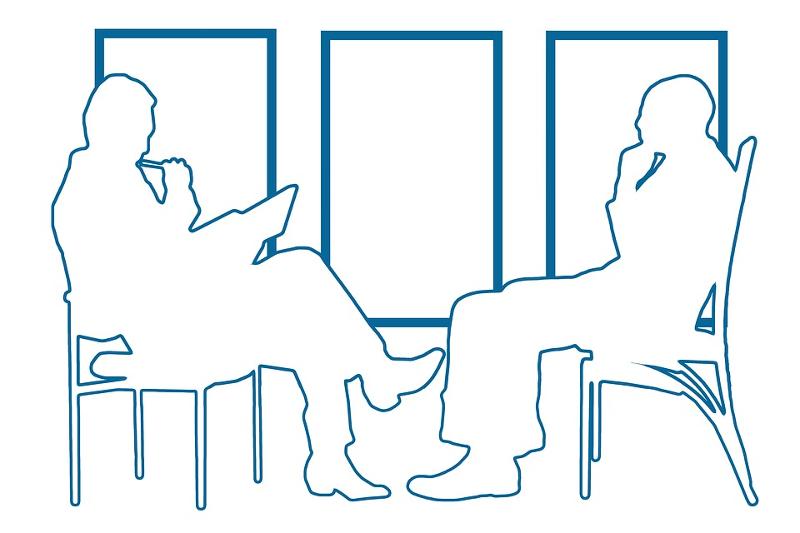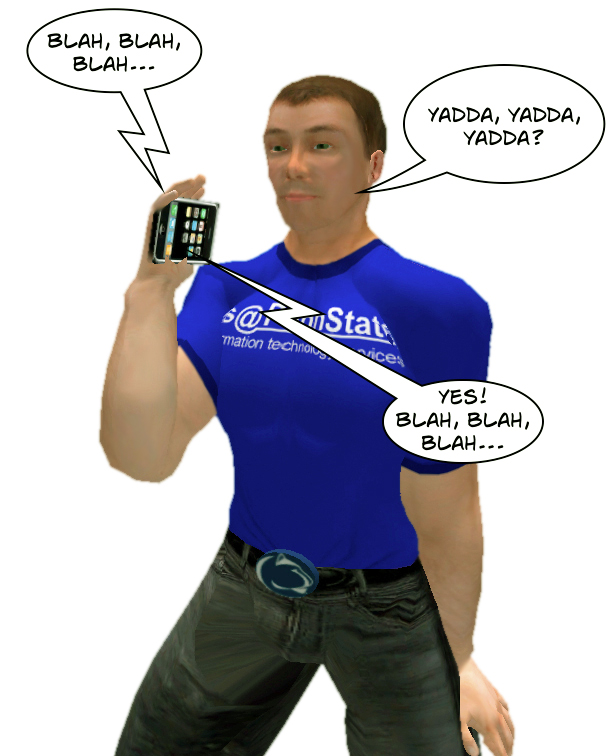
iStudy for Success!
Online learning tutorials for essential college skills.
This tutorial introduces you to basic interviewing skills. Interviewing is a common way to collect a rich set of data and take advantage of the knowledge and expertise of others. Employment interviewers certainly hope to do this when they talk with candidates for a position. Journalists also do this when they interview people for a story. Academic researchers also commonly use interviews to collect their data. 
When you conduct an interview, you gain practical experience with gathering data from a primary source. This kind of research demands a considerable amount of preparation and planning. You must also establish an atmosphere of trust, exchange information, give and receive feedback, and sometimes perform a follow-up interview. Interviews incorporate critical thinking and problem identification, as well as make use of many interpersonal skills such as active listening and note taking.
The main goal of this tutorial is to introduce you to some common interviewing techniques. Upon completion of this tutorial, you will be able to:
To learn more about how to conduct a successful interview, read the information and complete the activities.
Note: All external links in this tutorial will open in a new window or tab.
|
|
There are four basic steps to follow for any data-gathering interview.
A good researcher knows that preparation and planning often make the difference between a successful research project and a not-so-successful one. For example, some of the things you need to think about before you begin include how many people to interview, how long each interview should last, how many interviews should be done with each person, and what kind of equipment or supplies are needed. Before you start to prepare for an interview, you should first decide what you want to get out of the interview. This means, you will have to set goals for the interview, as well as understand the purpose of the interview. You should have interview questions prepared in advance - questions that will give you the information you need.
To prepare to conduct an interview, you should:
The types of questions you ask will determine the quality of the responses. Therefore, critical thinking skills are very important to this step in the process.
|
In conducting an interview, there are different types of questions you might ask.
These questions obtain knowledge and information by asking the interviewee to recall facts, terms, and basic concepts.
The types of questions that are associated with this level of critical thinking use the following key words: who, what, why, when, where, which, choose, find, how, define, label, show, spell, list, name, tell, recall, select, identify, recognize, record, relate, repeat, and underline.
For example:
These questions help an interviewer understand a topic by having the interviewee address facts and ideas through organizing, comparing, translating, interpreting, giving descriptions, and stating main ideas.
The types of questions that are associated with this level of critical thinking use the following key words: choose, cite examples of, compare, contrast, demonstrate, describe, determine, differentiate between, discriminate, discuss, interpret, explain, express, extend, give in own words, identify, illustrate, infer, interpret, locate, phrase, pick, practice, outline, relate, report, respond, restate, review, recognize, select, tell, translate, summarize, show, and simulate.
For example:
These questions obtain information by asking for solutions to problems in which the interviewee must apply acquired knowledge, facts, techniques, and rules.
The types of questions that are associated with this level of critical thinking use the following key words: apply, build, choose, construct, demonstrate, develop, dramatize, employ, generalize, illustrate, interpret, make use of, model, operate, practice, relate, schedule, select, shop, solve, use, utilize, and initiate.
For example:
These questions obtain information by asking the interviewee to examine problems, break information into parts, identify motives and causes, and show ways that a theory is supported.
The types of questions that are associated with this level of critical thinking use the following key words: analyze, appraise, calculate, categorize, compare, conclude, contrast, correlate, criticize, deduce, debate, detect, determine, develop, diagram, differentiate, distinguish, draw conclusions, estimate, evaluate, examine, experiment, identify, infer, inspect, inventory, predict, question, relate, solve, test, and diagnose.
For example:
These questions obtain information by asking the interviewee to solve problems, put ideas together, or to apply acquired knowledge, facts, techniques, and rules.
The types of questions that are associated with this level of critical thinking use the following key words: adapt, arrange, assemble, collect, compose, construct, create, design, develop, estimate, formulate, invent, improve, manage, modify, organize, plan, prepare, produce, propose, predict, reconstruct, set-up, solve, synthesize, systematize, and devise.
For example:
These questions ask the interviewee to present and defend opinions by judging information and the validity of certain ideas.
The types of questions that are associated with this level of critical thinking use the following key words: agree, appraise, assess, choose, compare, conclude, critique, decide, defend, estimate, evaluate, judge, measure, opinion, perceive, rate, revise, score, select, support, validate, value, and test.
For example:
When you ask a close-ended question, responses are limited to things such as a set of choices, a number, or a 'yes' or 'no' reply. Think of the many multiple choice or True or False tests you have taken during your career as a student. These are clear examples of close-ended questions. The advantage of using close-ended questions is that they tend to produce data that are objective or concrete - quick and easy to categorize, sort, and calculate.
For example:
Unlike close-ended questions, an open-ended question may result in a variety of responses. The answer is typically richer and contains more natural dialogue, resulting in more detailed information. You may learn about things you hadn't anticipated when you prepared for the interview. The type of data generated by open-ended questions is harder to categorize and sort; the analysis of this data is more time consuming for the interviewer or researcher.
For example:
One important aspect of a probing question is that it indicates to the person you are interviewing that you are really listening, because you probe - or follow up on - a response. When you ask a probing question you are seeking additional information, more detail, the interviewee's reaction, or clarification on some point. Sometimes this type of question is required to overcome an interviewee's reluctance to talk.
For example:
Check to see if you understand the different kinds of questions you can ask and when to use them by taking the short quiz below.

An agenda or interview guide is helpful to order questions and track the interview progress. It can help interviewers establish a good relationship with interviewees. It is important that you make sure the person you are interviewing understands what you want to talk about.
As the interview begins, you should start out seriously, with the easy questions first. This way you look professional, and will set the other person at ease - make them look smart! 
A non-judgmental atmosphere is what you want to develop when you gather data. When interviewing someone to gather information or data:
- Who you are
- The topic under investigation
- The purpose of the interview (goals and objectives)
- Take time to make sure you understand. This will make your interviewee less likely to be defensive.
- Provide reassurance that the information being given to you is useful and informative.
Check to see how much you remember and understand by taking the quiz below.

Think about possible answers to the questions you ask. Coming up with and evaluating your own answers allows you to prepare for the responses your interviewee might give. Can you come up with answers based on the information you have already received? If not, consider asking a new question because the information you've received has not yet met the goal and objectives of your interview.
As responses are given during the interview, apply your note taking skills (see the iStudy tutorial on Note-Taking). Be sure to record the responses received and revise your question list based on the responses. As the person is speaking, use his or her responses as a guide for developing additional questions. Respond mentally to each statement by putting the statement in the form of a question, using the various levels of critical thinking questions you have learned (i.e. "What? How? When? Where? and Why?").
Repeat the cycle of acquiring, understanding, applying, analyzing, synthesizing, and evaluating information until you are satisfied with the results.
Remember to:
Keep asking questions during the interview. When you're satisfied with the information you've collected, then you know the interview is over. Give the interviewee a chance to ask you any questions you can answer. You should also summarize the main results of the interview. Make sure, if possible, you have an opportunity to return if you have more questions later. Thank the interviewee for his or her time before you end the interview.
 Remember to:
Remember to:
Take the quiz below to check that you remember and understand what you read.

For additional information on interviewing, please consult the following references:
* Indicates that the original Website is no longer available.
When conducting an interview you need to be well prepared. Spend time thinking about the questions you will ask and the answers you might expect. Set the atmosphere of the interview so that it is pleasant yet professional, and don't forget to be a good listener.
During the interview, repeat the cycle of acquiring, understanding, applying, analyzing, synthesizing, and evaluating information until you are satisfied with the results.
Remember to:
The following are the assignments embedded in the Conducting an Interview tutorial:
This tutorial is related to other tutorials on personal effectiveness, including note-taking, active listening, active reading, conflict management, and brainstorming. Therefore, it is recommended that instructors introduce this tutorial to students in conjunction with other personal effectiveness tutorials.
Note : This is an excellent opportunity to utilize and reinforce the cooperative learning techniques found in the Cooperative Learning tutorial.
These points are covered in the iStudy tutorial, but should be emphasized in any discussions.
Through observing both group and the individual activities, the instructor may assess student performance. Assessment criteria are as follows (instructors supply the percentage weights):
|
Where |
Domain |
Activities |
% |
|---|---|---|---|
|
iStudy Tutorial |
Knowledge |
The student can describe a good interview atmosphere by listing three important processes to sustain during an interview. |
|
|
iStudy Tutorial |
Comprehension |
The student can explain why preparation is important and can give examples of how to plan for an interview. |
|
|
In-Class |
Application |
The student can make different types of interview questions. |
|
|
iStudy Tutorial |
Synthesis |
The student can analyze and evaluate an interview experience by creating criteria for a good interview. |
|
|
|
|
|
100% |